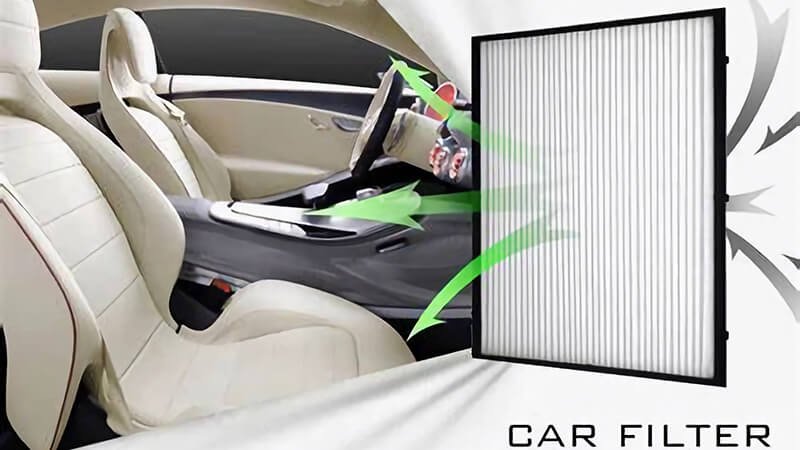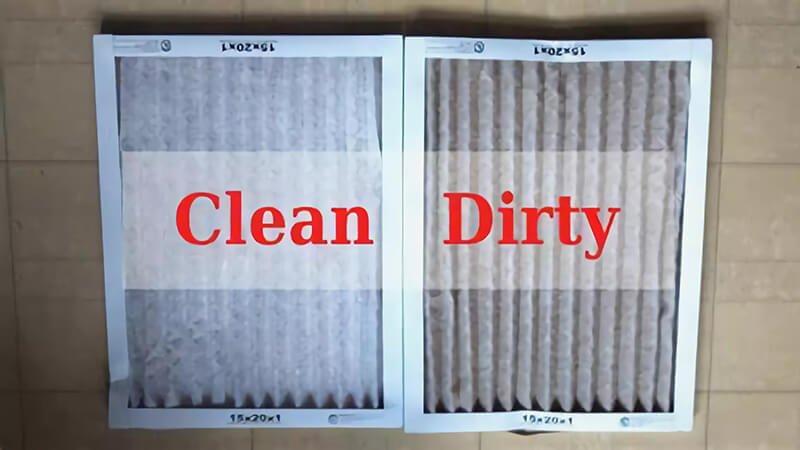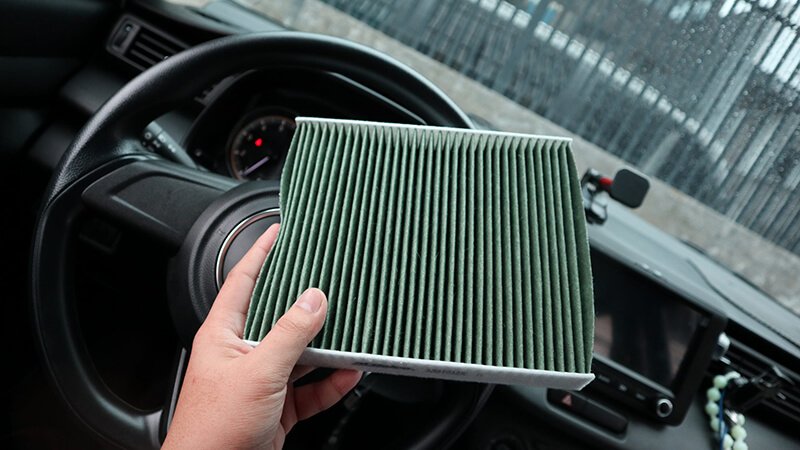Car maintenance is essential for ensuring the longevity and performance of your vehicle. One of the often-overlooked components is the air filter. Cleaning or replacing your car's air filter at the right time can significantly improve engine performance. But how often should you clean it? Let’s break it down.
Generally, it's recommended to check and clean or replace your car's air filter every 12,000 to 15,000 miles or once a year. However, the frequency depends on your driving conditions, location, and the type of air filter used in your car. Proper maintenance ensures optimal engine performance and fuel efficiency.
Now, let’s explore some common questions related to air filter maintenance. By understanding the lifespan, symptoms, and impact of a dirty air filter, you’ll be better equipped to take care of your car’s performance.

How Long Do Engine Air Filters Last?
One of the most frequently asked questions about automotive air filters is how long they last. The engine air filter plays a critical role in keeping dirt and debris out of your car's engine. Knowing when to replace it can save you from unnecessary repair costs and performance issues.
Typically, engine air filters should be replaced every 12,000 to 15,000 miles. However, if you frequently drive in dusty or polluted environments, you may need to replace it more often. Regular inspections are essential to ensure your engine remains protected.
The lifespan of an engine air filter1 varies depending on several factors, but the general rule of thumb is that it should be replaced every 12,000 to 15,000 miles or at least once a year. However, some conditions can require more frequent checks.
For instance, if you live in a dusty or polluted area, or if you often drive on dirt roads, your air filter will need to be replaced more often. In these conditions, dust and debris can clog the filter more quickly, which reduces its efficiency. Additionally, vehicles driven in urban environments with high levels of air pollution may require more frequent maintenance.
| Driving Condition | Air Filter Lifespan | Recommendation |
|---|---|---|
| Highway Driving (Clean environment) | 15,000 miles | Check every 12,000 miles |
| City Driving (Polluted area) | 10,000-12,000 miles | Check every 6-8 months |
| Off-Road Driving (Dusty roads) | 6,000-10,000 miles | Check every 3-4 months |
On the other hand, if you frequently drive in clean environments or on highways, the air filter may last longer. However, even in these conditions, it's still a good idea to inspect the air filter every 12,000 miles, as it can still accumulate dirt over time.
You should also consider the type of air filter your car uses. Some modern air filters are made from synthetic materials that last longer than traditional paper filters. If your vehicle is equipped with such a filter, it may need to be replaced less frequently. Always check your vehicle’s manual or consult with your mechanic for specific recommendations regarding your car’s air filter.
Regularly replacing the air filter not only helps maintain engine performance but also improves fuel efficiency and reduces harmful emissions. A clogged air filter restricts airflow to the engine, causing it to work harder, leading to lower fuel efficiency and higher emissions. Therefore, replacing it on time is an investment in your vehicle's overall performance and your wallet.

How Do I Know If My Air Filter Needs Cleaning?
Recognizing when your car’s air filter needs cleaning is not always straightforward. A dirty air filter doesn’t always give obvious signs, but there are a few symptoms that can indicate it’s time for a checkup.
Signs that your air filter needs cleaning or replacement include reduced engine performance, strange engine noises, and poor fuel efficiency. If you notice any of these symptoms, it’s a good idea to inspect the filter and clean or replace it accordingly.
Detecting the need to clean or replace your air filter can be tricky because it doesn’t always show clear symptoms. However, several signs may indicate that your filter is clogged and in need of maintenance.
One of the first signs is a noticeable decrease in engine performance2. A dirty air filter restricts the airflow into the engine, which can cause it to run less efficiently. This can manifest as sluggish acceleration or rough idling. If you notice that your car isn’t as responsive as it used to be, the air filter could be the culprit.
Common Symptoms of a Dirty Air Filter:
| Symptom | Possible Cause |
|---|---|
| Sluggish Acceleration | Reduced air intake due to filter clogging |
| Poor Fuel Efficiency | Engine compensates for restricted air intake by consuming more fuel |
| Unusual Engine Noises | Backfiring or engine struggling to burn fuel properly |
| Check Engine Light | Engine may detect improper air-to-fuel ratio |
Another indicator is a drop in fuel efficiency3. When the air filter is clogged, the engine has to work harder to pull in air, which can lead to higher fuel consumption. If your fuel economy seems to be getting worse without any other apparent reason, it's worth checking the air filter.
Strange engine noises, like backfiring or unusual humming, can also point to an issue with the air filter. This happens because the engine is struggling to get the right amount of air, which affects its combustion process. If you hear such noises, it’s important to inspect the filter right away.
If you have trouble with starting the car or if the engine stalls unexpectedly, it could be due to a clogged air filter. This is a more severe symptom and should prompt an immediate check of the air filter.
In general, if any of these signs are present, it’s best to inspect the air filter. If it appears dirty or clogged, it should be cleaned or replaced. Taking care of this early can help you avoid further issues that could affect your engine’s performance and longevity.

What Are the Symptoms of a Dirty Air Filter in a Car?
A dirty air filter can have a significant impact on your car’s performance. Understanding the symptoms of a clogged air filter can help you address the problem before it causes more serious damage to the engine.
Common symptoms of a dirty air filter include reduced engine power, increased fuel consumption, strange engine sounds, and the illumination of the check engine light. If you experience any of these, it’s crucial to check your air filter and clean or replace it as necessary.
The symptoms of a dirty air filter can vary depending on the severity of the clog and the type of vehicle you own. However, there are some common signs that you should look out for.
One of the most noticeable symptoms is a significant decrease in engine power4. If your car feels sluggish when accelerating or struggles to reach higher speeds, the air filter may be clogged. When the filter is dirty, the engine doesn’t get enough air, which reduces its overall performance.
Key Symptoms of a Clogged Air Filter:
| Symptom | Effect |
|---|---|
| Sluggish acceleration | Reduced airflow causes inefficient combustion |
| Reduced horsepower | Engine struggles to burn air-fuel mixture effectively |
| Decreased fuel economy | Engine compensates by using more fuel for same performance |
| Strange engine sounds | Improper air-to-fuel mixture affects combustion, causing noise |
| Engine misfire | Air filter prevents optimal airflow, leading to engine misfires |
| Illuminated check engine light5 | Sensors detect air intake issues, triggering a warning |
A dirty air filter can also cause a noticeable drop in fuel efficiency. Since the engine has to work harder to draw in air, it consumes more fuel to operate. If you notice that you're filling up your gas tank more often than usual, this could be a direct result of a clogged air filter. Keeping your air filter clean helps your vehicle run more efficiently, leading to better gas mileage.
Another symptom is unusual engine sounds. When the air filter is clogged, the engine might produce strange noises, such as backfiring or a rough idle. This occurs because the engine is struggling to get the proper air-to-fuel ratio for combustion. These sounds can indicate that the air filter is restricting airflow to the engine, affecting its performance.
Finally, the check engine light may come on if the air filter is too dirty. Modern vehicles have sensors that monitor air intake and engine performance. When the air filter is clogged, it can trigger the check engine light, indicating that the system is detecting a problem. If the light comes on, it’s essential to check the air filter and replace or clean it if necessary.
By recognizing these symptoms early, you can avoid further damage to your vehicle's engine and ensure that it continues to perform at its best.

What Happens If You Don’t Clean the Air Filter in Your Car?
Neglecting to clean or replace your air filter can lead to a host of problems. If you continue to drive with a dirty or clogged air filter, the effects can worsen over time, resulting in more costly repairs down the road.
If you don't clean your car’s air filter, it can lead to poor engine performance, reduced fuel efficiency, and even damage to engine components. Over time, neglecting this simple maintenance task can result in costly repairs and a less reliable vehicle.
Failing to clean or replace your car's air filter regularly can have significant consequences for your vehicle’s performance. At first, you may notice a small decrease in engine power and a drop in fuel efficiency. However, as the air filter continues to clog, the problems can escalate quickly.
One of the most severe issues is the potential for engine damage6. A clogged air filter can prevent enough clean air from reaching the engine, leading to incomplete combustion. This can cause carbon buildup, which over time, can damage components like the spark plugs, valves, and cylinders. If left unchecked, this could result in costly repairs or even engine failure.
Long-Term Effects of a Dirty Air Filter:
| Consequence | Description |
|---|---|
| Engine damage | Lack of proper airflow leads to incomplete combustion and engine strain |
| Increased emissions | Dirty filter disrupts air-fuel ratio, causing higher emissions |
| Reduced engine life | Strain on engine components leads to faster wear and tear |
| Higher maintenance costs | More severe damage leads to expensive repairs |
Another consequence is increased emissions7. A dirty air filter can disrupt the air-to-fuel ratio in your engine, causing it to produce more emissions than necessary. This not only affects the environment but can also lead to your vehicle failing an emissions test.
Furthermore, neglecting the air filter can place additional strain on other engine components. The engine has to work harder to compensate for the lack of airflow, which can lead to overheating, increased wear and tear, and a shorter lifespan for critical engine parts.
Regularly cleaning or replacing the air filter ensures that your vehicle runs smoothly and efficiently. This simple maintenance task is a small investment that can save you from much bigger and more expensive problems in the future.

Conclusion
In summary, cleaning or replacing your car's air filter8 is an important aspect of routine vehicle maintenance. By checking it every 12,000 to 15,000 miles or once a year, and being aware of the signs of a dirty air filter, you can keep your engine running smoothly. Don't neglect this essential task, as it helps improve fuel efficiency, protect engine components, and prolong the life of your vehicle.
-
Understanding the lifespan of an engine air filter can help you maintain your vehicle's performance and efficiency. Explore this link for detailed insights. ↩
-
Understanding the causes of engine performance decrease can help you maintain your vehicle better and avoid costly repairs. ↩
-
Exploring this topic can provide insights into improving your vehicle's fuel economy and overall performance. ↩
-
Understanding the causes of decreased engine power can help you diagnose issues early and maintain your vehicle's performance. ↩
-
Learning about the check engine light can help you understand potential issues with your vehicle and take timely action to prevent damage. ↩
-
Understanding engine damage can help you prevent costly repairs and maintain your vehicle's performance. ↩
-
Learn how a clean air filter can reduce emissions and improve environmental impact. ↩
-
Know more things about air filter from Runex, and get your best products and price for your besiness. ↩













